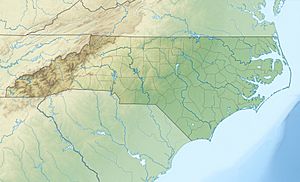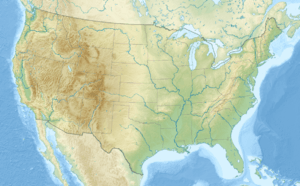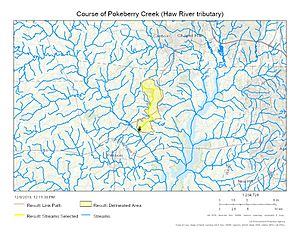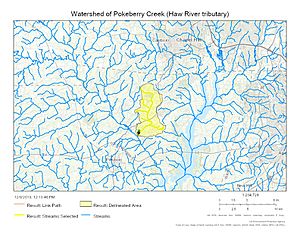Pokeberry Creek (Haw River tributary) facts for kids
Quick facts for kids Pokeberry Creek |
|
|---|---|
|
Location of Pokeberry Creek mouth
|
|
| Other name(s) | Tributary to Haw River |
| Country | United States |
| State | North Carolina |
| County | Chatham |
| Physical characteristics | |
| Main source | divide between Pokeberry Creek and Morgan Creek about 5 miles southwest of Chapel Hill, North Carolina 552 ft (168 m) 35°50′28″N 079°07′26″W / 35.84111°N 79.12389°W |
| River mouth | Haw River about 1 mile southeast of Bynum, North Carolina 290 ft (88 m) 35°45′48″N 079°07′52″W / 35.76333°N 79.13111°W |
| Length | 7.82 mi (12.59 km) |
| Basin features | |
| Progression | southwest |
| River system | Haw River |
| Basin size | 12.81 square miles (33.2 km2) |
| Tributaries |
|
| Bridges | Great Ridge Parkway, Catulio Run, Andrews Store Road, Morris Road, US 15, Bynum Ridge Road |
Pokeberry Creek is a small stream, about 7.82 mi (12.59 km) long, located in Chatham County, North Carolina. It's a "3rd order tributary," which means it's a smaller stream that flows into a larger one, the Haw River. This creek is one of only two streams in the United States with the name Pokeberry Creek. The other one is found in Indiana.
Contents
Journey of Pokeberry Creek
Pokeberry Creek begins its journey about 5 miles southwest of Chapel Hill, North Carolina. This starting point is in Chatham County.
Where the Creek Flows
From its source, the creek flows generally towards the southwest. It continues its path until it reaches the Haw River. This meeting point is just a short distance downstream from the town of Bynum.
Understanding the Creek's Watershed
A watershed is like a big bowl that collects all the rain and snowmelt. All the water in this "bowl" eventually drains into a single stream, river, or lake.
Size and Features of the Watershed
The Pokeberry Creek watershed covers an area of about 12.81 square miles (33.2 km2). This means all the land within this area drains into Pokeberry Creek. The area gets about 47.4 inches of rain each year. A large part of the watershed, about 71%, is covered by forests. These forests help keep the water clean and healthy.
Images for kids
 | Stephanie Wilson |
 | Charles Bolden |
 | Ronald McNair |
 | Frederick D. Gregory |





